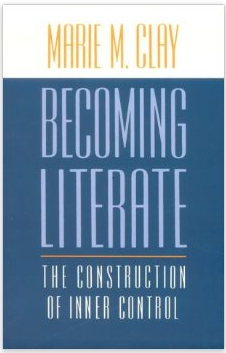I had the opportunity to be trained as a Reading Recovery teacher.
I have to tell you, it was the best literacy training I have ever received!
Don't get me wrong, my alma mater has a wonderful reputation for preparing teachers!
I slight them none.
At the time, we Americans just weren't aware of the phenomenal literacy practices taking place in other lands, specifically New Zealand!
The year I spent learning all the ends and outs of Reading Recovery was one of the most challenging, yet rewarding years in my teaching career.
I had the chance to meet Irene Fountas and Gay Su Pinnell,
AND... Marie Clay herself attended my RR graduation.
Here's a pic just to prove it.
Not the best or most flattering pic, but the only one I have with Marie Clay!
Yes, those are shoulder pads!
I was wearing stockings, too.
Cream colored panty hose and cream flats.
Oh, 1994!
Yes, those are shoulder pads!
I was wearing stockings, too.
Cream colored panty hose and cream flats.
Oh, 1994!
Marie had just shaken my hand!
If you are a teacher nerd like me, you get that!!
If you are a teacher nerd like me, you get that!!
Moving on, it's been quite a while since I returned to the regular classroom,
but the strategies and beliefs of Reading Recovery have stayed with me.
I'd love to share with you what I learned from this incredible program!
Today, I'll just hit the highlights of a Reading Recovery Lesson.
In the posts to come, I'll break down each part of the lesson and share how I use them in my Guided Reading lessons.
Components of a Reading Recovery Lesson
Reading Recovery lessons last 30 minutes.
The first ten lessons in RR are called Roaming. They give you a chance to get to know the child and his/her strengths and weaknesses. More on this next time!
1) Familiar Reread-RR lessons begin with re-readings of familiar books. The child reads 2-4 familiar books depending on book level and time.
 2) Running Record-The last familiar reread is the book introduced the day before. This is where the running record is taken each day.
2) Running Record-The last familiar reread is the book introduced the day before. This is where the running record is taken each day. 3) Teaching Points-After the running record, the teacher chooses 1-2 teaching points based on what she observed. Maybe 1 critical and 1 smaller point. Nothing overwhelming.
4) Word Work-We all know what word work is. Break out those magnetic letters!

5) Writing-In this part of the lesson, the child constructs a short "story." This is actually a sentence, but children like to call it a story. This is where Elkonin Boxes come in!
6) Cut-apart Sentence-After the child constructs his/her "story" and reads it aloud, the teacher records it on a sentence strip and cuts the sentence strip apart for the child to manipulate.
7) New Book-The last part of a RR lesson is the new book. The teacher and child take a picture walk as the new book is introduced. Then the child reads the book for the first time, putting into practice new word solving strategies.
Wow! That's a lot!
And, this was just a skeleton of Reading Recovery.
Later this week, I'll post on Roaming and Familiar Re-reads!
Happy Sunday, friends!
By the way, Check out Marie Clay's books!
She is truly a wealth of information!
She is truly a wealth of information!




